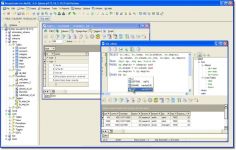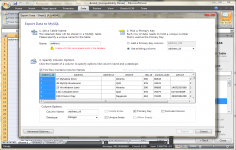 MySQL 5.1.39
MySQL 5.1.39
MySQL AB - (Open Source)
MySQL is a successful open source database used in most web applications, e-commerce and online transaction processing.
MySQL is one of the world's most famous and used open source database. The software can be used to manage web applications, e-commerce and online transaction processing since MySQL database incorporates support those transactions. It is also commonly associated with PHP when it comes to managing websites.
With standard JDBC , ODBC, and Net, the developer can choose the programming language. MySQL has the advantage of working with almost all the popular operating systems and communicate easily with programming languages ​​such as C, C + +, VB, C #, PHP, Python, Ruby, Java, Perl, Eiffel, etc.MySQL replication allows you to create profitable applications. In addition, it enables the development of typologies replication complex and massive chain.Its reliability and robustness, performance, ease of use makes MySQL have more success than anticipated.
- Title:
- MySQL 5.1.39
- File Size:
- 39.0 MB
- Requirements:
- Windows 9x / 2000 / XP / Vista / Windows7 / Windows8
- Language:
- en-us
- License:
- Open Source
- Date Added:
- 21 Sep 2009
- Publisher:
- MySQL AB
- Homepage:
- http://www.mysql.com
- MD5 Checksum:
- 1EBB396F757DE4E1BD0A75AB10C69930
Bugs fixed:
* Partitioning: An INSERT ... SELECT statement on an empty partition of a partitioned table failed with ERROR 1030 (HY000): Got error 124 from storage engine. This issue also caused queries run against a partitioned table while a LOAD DATA CONCURRENT INFILE statement was in progress to fail with the same error. (Bug#46639: http://bugs.mysql.com/46639) See also Bug#35845: http://bugs.mysql.com/35845, Bug#44657: http://bugs.mysql.com/44657, Bug#45840: http://bugs.mysql.com/45840.
* Partitioning: A partitioned table having a TIMESTAMP column with a default value of CURRENT_TIMESTAMP and this column was not defined using an ON UPDATE option, an ALTER TABLE ...REORGANIZE PARTITION statement on the table caused the TIMESTAMP column value to be set to CURRENT_TIMESTAMP regardless. (Bug#46478: http://bugs.mysql.com/46478)
* Partitioning: Attempting to access a partitioned table when partitioning support was disabled in a MySQL server binary that had been compiled with partitioning support caused the server to crash. (Bug#39893: http://bugs.mysql.com/39893)
* Partitioning: The use of TO_DAYS() in the partitioning expression led to selection failures when the column having the date value contained invalid dates. This occurred because the function returns NULL in such cases, and the partition containing NULL values was pruned away. For example, this problem occurred if '2001-02-00' was inserted into a DATE column of such a table, and a subsequent query on this table used WHERE date_col < '2001-02-00' --- while '2001-01-01' is
less than '2001-02-00', TO_DAYS('2001-02-00') evaluates as NULL, and so the row containing '2001-01-01' was not returned. Now, for tables using RANGE or LIST partitioning and having TO_DAYS() in the partitioning expression, the NULL partition
is also scanned instead of being ignored. The fix for this issue also corrects misbehavior such that a query of the form SELECT * FROM table WHERE date_col <
date_val on a table partitioned by RANGE or LIST was handled as though the server SQL mode included ALLOW_INVALID_DATES even if this was not actually part of the server SQL mode at the time the query was issued. (Bug#20577: http://bugs.mysql.com/20577) See also Bug#18198: http://bugs.mysql.com/18198,
Bug#32021: http://bugs.mysql.com/32021, Bug#46362: http://bugs.mysql.com/46362.
* Replication: Performing a multi-row update of the AUTO_INCREMENT column of a transactional table could result in an inconsistency between master and slave when there was a trigger on the transactional table that updated a non-transactional table. When such an update failed on the master, no rows were updated on the master, but some rows could (erroneously) be updated on the slave. (Bug#46864: http://bugs.mysql.com/46864)
* Replication: When using the --replicate-rewrite-db option and the database referenced by this option on the master was the current database when the connection to the slave was closed, any temporary tables existing in this database were not properly dropped. (Bug#46861: http://bugs.mysql.com/46861)
* Replication: When a statement that changed both transactional and non-transactional tables failed, the transactional changes were automatically rolled back on the master but the slave ignored the error and did not roll them back, thus leading to inconsistencies between master and slave. This issue is fixed by automatically rolling back a statement that fails on the slave; however, the transaction is not rolled back unless a corresponding ROLLBACK statement is found in the relay log file.(Bug#46130: http://bugs.mysql.com/46130) See also Bug#33864: http://bugs.mysql.com/33864.
* Replication: When slave_transaction_retries is set, a statement that replicates, but is then rolled back due to a deadlock on the slave, should be retried. However, in certain cases, replication was stopped with error 1213 (Deadlock found when trying to get lock; try restarting transaction) instead, even when this variable was set. (Bug#45694: http://bugs.mysql.com/45694)
* Replication: The binary logging behavior (and thus, the replication behavior) of CREATE DATABASE IF NOT EXISTS, CREATE TABLE IF NOT EXISTS, and CREATE EVENT IF NOT EXISTS was not consistent among these statements, nor with that of DROP DATABASE IF EXISTS, DROP TABLE IF EXISTS, and DROP EVENT IF EXISTS: A DROP ... IF EXISTS statement is always logged even if the database object named in the statement does not exist. However, of the CREATE ... IF NOT EXISTS statements, only the CREATE EVENT IF NOT EXISTS statement was logged when the database object named in the statement already existed.Now, every CREATE ... IF NOT EXISTS statement is written to the binary log (and thus replicated), whether the database object named in the statement exists or not. For more information, see Section 16.3.1.3, "Replication of CREATE ...IF NOT EXISTS Statements."Exception. Replication and logging of CREATE TABLE IF NOT EXISTS ... SELECT continues to be handled according to existing rules. See Section 16.3.1.4, "Replication of CREATE TABLE ... SELECT Statements," for more information.(Bug#45574: http://bugs.mysql.com/45574)
* Replication: When using statement-based replication,database-level character sets were not always honored by the replication SQL thread. This could cause data inserted on the master using LOAD DATA to be replicated using the wrong character set. Note This was not an issue when using row-based replication. (Bug#45516: http://bugs.mysql.com/45516)
* Replication: In some cases, a STOP SLAVE statement could cause the replication slave to crash. This issue was specific to MySQL on Windows or Macintosh platforms. (Bug#45238: http://bugs.mysql.com/45238, Bug#45242: http://bugs.mysql.com/45242, Bug#45243: http://bugs.mysql.com/45243, Bug#46013: http://bugs.mysql.com/46013, Bug#46014: http://bugs.mysql.com/46014, Bug#46030: http://bugs.mysql.com/46030)
* Replication: Creating a scheduled event whose DEFINER clause was either set to CURRENT_USER or not set explicitly caused the master and the slave to become inconsistent. This issue stems from the fact that, in both cases, the DEFINER is set to the CURRENT_USER of the current thread. (On the master, the CURRENT_USER is the mysqld user; on the slave, the CURRENT_USER is empty.)This behavior has been modified as follows: + If CURRENT_USER is used as the DEFINER, it is replaced with the value of CURRENT_USER before the CREATE EVENT statement is written to the binary log.+ If the definer is not set explicitly, a DEFINER clause using the value of CURRENT_USER is added to the CREATE EVENT statement before it is written to the binary log.(Bug#44331: http://bugs.mysql.com/44331)See also Bug#42217: http://bugs.mysql.com/42217.
* Replication: When using the statement-based logging format, the only possible safe combination of transactional and non-transactional statements within the same transaction is to perform any updates on non-transactional tables (such as MyISAM tables) first, before updating any transactional tables (such as those using the InnoDB storage engine). This is due to the fact that, although a modification made to a non-transactional table is immediately visible to other connections, the update is not immediately written to the binary log, which can lead to inconsistencies between master and slave. (Other combinations may hide a causal dependency, thus making it impossible to write statements updating non-transactional tables to the binary log in the correct order.)However, in some cases, this situation was not handled properly, and the determination whether a given statement was safe or not under these conditions was not always correct. In particular, a multi-table update that affected both transactional and non-transactional tables or a statement modifying data in a non-transactional table having a trigger that operated on a transactional table (or the reverse) was not determined to be unsafe when it should have been.With this fix, the following determinations regarding replication safety are made when combining updates to transactional and non-transactional tables within the same transaction in statement-based logging mode:
1. Any statement modifying data in a non-transactional table within a given transaction is considered safe if it is issued prior to any data modification statement accessing a transactional table within the same transaction.
2. A statement that updates transactional tables only is always considered safe.
3. A statement affecting both transactional and non-transactional tables within a transaction is always considered unsafe. It is not necessary that both tables be modified for this to be true; for example, a statement such as INSERT INTO innodb_table SELECT * FROM myisam_table is also considered unsafe.
Note: The current fix is valid only when using statement-based logging mode; we plan to address similar issues occurring when using the MIXED or ROW format in a future MySQL release. (Bug#28976: http://bugs.mysql.com/28976)
* Stack overflow checking did not account for the size of the structure stored in the heap. (Bug#46807: http://bugs.mysql.com/46807)
* In queries for which the loose index scan access method was chosen, using a condition of the form col_name rather than the equivalent col_name <> 0 caused an assertion failure.(Bug#46607: http://bugs.mysql.com/46607)
* Killing a query that was performing a sort could result in a memory leak. (Bug#45962: http://bugs.mysql.com/45962)
* Truncation of DECIMAL values could lead to assertion failures;for example, when deducing the type of a table column from a literal DECIMAL value.(Bug#45261: http://bugs.mysql.com/45261)
* Bulk insert performance could suffer with large read_buffer_size values. (Bug#44723: http://bugs.mysql.com/44723)
* A buffer overflow could occur during handling of IS NULL ranges. (Bug#37044: http://bugs.mysql.com/37044)
* mysqladmin --wait ping crashed on Windows systems.(Bug#35132: http://bugs.mysql.com/35132)
Related software
2.1/5 from 178 users


